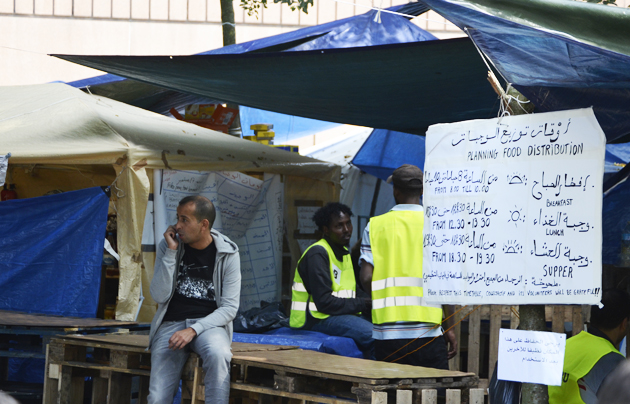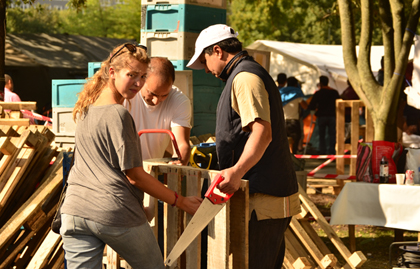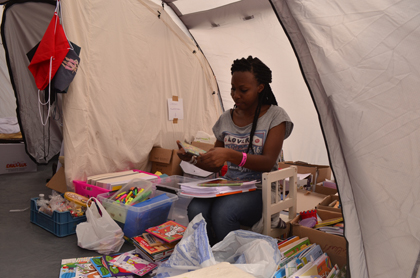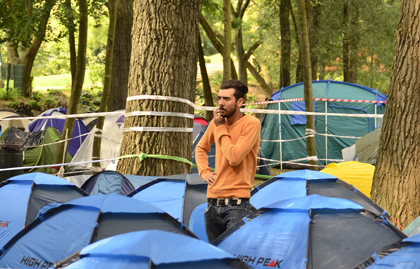Before winter starts
Comradeship and solidarity mark the daily life of the refugee camp in Brussels, as NGOs and volunteers serve asylum seekers waiting for an appointment at the Foreigners’ Office.
BRUSSELS · 17 SEPTEMBER 2015 · 10:16 CET

“Did you enjoy the day?” Frank*, a Belgian of Rwandese origin, is at the welcome desk for volunteers and is in charge of assigning them different tasks.
He lives in a town 200 km from Brussels, but came to the capital on Sunday 6 September to see someone, visited the camp and decided to stay. He has not been home for the past few days.
The Brussels refugee camp opened around two weeks ago. The Foreigners' Office is next to Brussels-North station, and five or six families from Syria and Iraq started to camp in the nearby Parc Maximilien. After the picture of Alan, the Syrian boy found dead on a Turkish beach, went viral on social media, citizens all around Europe began to get involved, more asylum seekers arrived and the park started to take the shape of a settled refugee camp rather than a provisional place to wait. Now, there are so many refugees that they have to wait more than 6 days to get an appointment at the office.
On Sunday, the 6 of September, a large citizens’ assembly was organized. Thousands of people posted on Facebook that they would attend, so they had to change the location. The assembly was well coordinated and they split people between areas: logistics, supply, lobbying, communications, health…

Each group had to name two or three supervisors and organize themselves. The problem is that volunteers often have a job, a family and a life, and obviously cannot spend their day in the camp. There are, however, a bunch of volunteers that live on site and sleep in a big tent provided by Doctors without Borders.
THE “Fs”: FAMILIARITY, FIRST-NAME TERMS AND FRIENDSHIPS
I approach Frank and give the name of the contact that has sent me there. “Do you know Arthur Brennan?”, I ask. “Who?”, he replies, before adding: “Ah! Yes, I know Arthur”. I then understand there are no last names on the camp. Everyone seems very friendly, informal and is on first-name terms with you as soon as you open your mouth to talk to them.
Also, some people know names but not faces, and vice-versa. Frank is a little stressed and says he has to go to a meeting of the area managers. “Can I come with you?”, I ask. “I am actually interested in how you organize the camp.” He agrees and I wait next to him until 4 pm.
From his perspective, inside his tent, everything changes. In a quarter of an hour I see a dozen volunteers come and pick up gloves and garbage bags to clean the camp, two or three guys who speak Arabic come to give their translating services, some people from the organization pass by and some refugees come for information (although it is not the info point for them). “Make sure you talk with other refugees and volunteers and establish links and show you care for them,” he says to the volunteers coming for the first time.
A volunteer arrives with another refugee. “Do you speak English?” I hear somebody say. Frank asks me to translate for them. They are both from sub-Saharan Africa but I cannot say where exactly. “This guy”, says the volunteer pointing the other, “has a story to tell. Could you give him some paper and a pen so he can write it down?” Frank looks a bit at a loss: it is not his job to provide paper, but he does so and asks the volunteer: “Did you sleep well last night?”
Frank explains to me: “You see, we have been here for so many days, we have to care for each other.” The living conditions are very poor, although the city council has provided showers and toilets (the kind you see in music festivals). Samusocial, an NGO that started working with the homeless and since 2010 also with asylum seekers, is taking care of hygiene on the camp. Médecins du Monde is in charge of health. For the rest, there are a lot of small organizations that are providing support.
WHO IS IN CHARGE?
Perhaps that is the main problem: the citizen platform that called for the assembly does not coordinate the NGOs, and although they certainly work and collaborate, there is a lack of centralization both of the resources and the information.
The daily meeting starts at 4.10 pm. There are several points on the agenda. A young woman about 22 years-old presides the meeting and gives the floor to the volunteers who raise their hands. There are more or less twenty people in the meeting and they all seem to know each other. It looks like almost all of them sleep on site. Many of the points are positive but people complain of the lack of organization and communication.
Nevertheless, the overall assessment of the volunteers is not as bad. “It’s not a camp anymore, now we have a village,” says a man with black glasses who works with the security team. Apparently there’s a hairdresser who will be coming, and since Monday 7 September there has been carpentry workshop.

The school has been running for a week and a half, and the kitchen, almost since the beginning. The Salvation Army is going to rebuild it so there’s not so much chaos during meal times. Electricity is also provided by the CPAS (Public Centres of Social Action) and free wifi hotspots by Proximus, whose headquarters are a few blocks from the park.
THE “GREY AREAS”: WHAT ARE OUR MOTIVATIONS?
But let’s not paint it all in rosy colours. As much as people help, others try to take advantage. Companies are advertising their products on the camp, Jehova’s Witnesses are at the entrance offering Bible courses, people from outside come to take advantage of free food, and theft is common in the tents around the edges of the camp.
Yes, the camp, like the refugee crisis in general, shows the best and the worst of human beings; volunteers are offended because their name is not mentioned anywhere, and the small egos of those who are in charge are scared of being supplanted by kind-hearted (often more professional) people who come to propose improvements.
“I want people to ask themselves this question: what are you here for?” demands Said, a refugee who represents the camp before the Federal government. “We are helping the refugees; our reward will come from God.”
The volunteers are also very tired. Some stay on the camp 24/7, and the lack of communication and organization increases the stress. Maybe it is time to take care of the volunteers, not only the refugees, as they are giving a lot of time and energy. “I have children and a husband and want to return for a day or two to my 'civil' life”, says Fadiya, who manages the food. She is hard to replace because she speaks Arabic, French and Flemish. Who, with those characteristics, can replace her for a full day or two?
SECURITY AND LEGAL ISSUES
Exhaustion affects the security team especially. Five to six men keep watch over the whole camp and they cannot prevent the thefts. They are legally not allowed to wear any kind of tag or distinction that could dissuade thieves and pick-pockets because they have no professional training. One guy freaks out: “There are national security agents infiltrating the camp.” According to the volunteers, the police refuse to secure the area because their competence is for “urban areas”. To what extent the camp (a public park) is “urban” or not is, as yet, an unresolved question.

Of course, the park is occupied and it is not a lawful situation. The City Council looks away, while it points at the Federal Government. Would we leave the refugees on the streets, camp by themselves? The Federal Government has said it will only open 250 files a day, which is “the office’s maximum capacity”. Théo Francken, from the right-wing NV-A, a man accused of having made racist statements more than once, is the Secretary of State for Migration in the Michel government. Belgium has had many left-wing (socialist) or centrist governments. It’s the first time for decades that there is a right-wing coalition.
Another man called Max, who wears a suit, says: “I hope we are not going to be here longer than a fortnight”. He explains that if something bad happens – a disease spreading, a fight with knives – it will give an opportunity for the government to dismantle the camp. What will then happen with the refugees? “We have to be out of here before winter starts,” concludes Max.
*For practical and privacy reasons, all the first names have been changed.
Published in: Evangelical Focus - cities - Before winter starts
